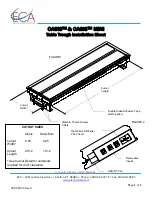
10
EXERCISE GUIDELINES
FOUR TYPES OF STRENGTH WORKOUTS
Note: A “repetition” is one complete cycle of an exer-
cise, such as one sit-up. A “set” is a series of
repetitions.
Muscle Building
—Work your muscles near their max-
imum capacity and progressively increase the intensity
of your exercise. Adjust the intensity level of an individ-
ual exercise as follows:
• Change the amount of resistance used.
• Change the number of repetitions or sets performed.
Use your own judgment to determine the amount of
resistance that is right for you. Begin with 3 sets of 8
repetitions for each exercise you perform. Rest for 3
minutes after each set. When you can complete 3 sets
of 12 repetitions without difficulty, increase the amount
of resistance.
Toning
—Tone your muscles by working them to a
moderate percentage of their capacity. Select a mod-
erate amount of resistance and increase the number
of repetitions in each set. Complete as many sets of
15 to 20 repetitions as possible without discomfort.
Rest for 1 minute after each set. Work your muscles
by completing more sets rather than by using high
amounts of resistance.
Weight Loss
—To lose weight, use a low amount of
resistance and increase the number of repetitions in
each set. Exercise for 20 to 30 minutes, resting for a
maximum of 30 seconds between sets.
Cross Training
—Combine strength training and aero-
bic exercise by following this type of program:
• Strength training workouts on Monday, Wednesday,
and Friday.
• 20 to 30 minutes of aerobic exercise on Tuesday
and Thursday.
• One full day of rest each week to give your body
time to regenerate.
WORKOUT GUIDELINES
Familiarize yourself with the equipment and learn the
proper form for each exercise. Use your own judgment
to determine the appropriate length of time for each
workout, and the numbers of repetitions and sets to
complete. Progress at your own pace and be sensitive
to your bodyʼs signals. Follow each workout with at
least one day of rest.
Warming Up
—Start with 5 to 10 minutes of stretching
and light exercise. A warm-up increases your body
temperature, heart rate, and circulation in preparation
for exercise.
Working Out
—Include 6 to 10 different exercises in
each workout. Select exercises for every major muscle
group, emphasizing areas that you want to develop. To
give balance and variety to your workouts, vary the
exercises from workout to workout.
Cooling Down
—Finish with 5 to 10 minutes of
stretching. Stretching increases the flexibility of your
muscles and helps to prevent post-exercise problems.
EXERCISE FORM
Move through the full range of motion for each exer-
cise and move only the appropriate parts of the body.
Perform the repetitions in each set smoothly and with-
out pausing. The exertion stage of each repetition
should last about half as long as the return stage.
Exhale during the exertion stage of each repetition and
inhale during the return stroke. Never hold your
breath.
Rest for a short period of time after each set:
• Muscle Building—Rest for three minutes after each
set.
• Toning—Rest for one minute after each set.
• Weight Loss—Rest for 30 seconds after each set.
STAYING MOTIVATED
For motivation, keep a record of each workout. Write
the date, the exercises performed, the resistance
used, and the numbers of sets and repetitions com-
pleted. Record your weight and key body
measurements once a month. To achieve good results,
make exercise a regular and enjoyable part of your
life.






























